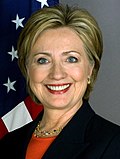This article needs additional citations for verification .(January 2017) |
Clintonism | |
|---|---|
| Founder | Bill and Hillary Clinton |
| Ideology | Liberal internationalism |
| Political position | Center to center-right |
| National affiliation | Democratic Party |
| Colors | Blue |
Clintonism refers to the political and economic policies of Bill and Hillary Clinton, as well as the era of his presidency in the United States. Members of the Democratic Party who are aligned with these political policies and practices are called Clinton Democrats.
Contents
The Democratic Leadership Council (DLC), a pro-Democratic Party establishment, argues that Clintonism "stands for economic growth and opportunity; for fiscal responsibility; for work, not welfare; for preventing crime and punishing criminals; and for non-bureaucratic, empowering government" and further says that "these policies are key to the successes in the beginning of the 21st century." [11]
On the other hand, some critics of Clinton associate Clintonism with "coddling big money (except guns and tobacco), financial scandals, winning at any cost, flip-flopping and prevaricating". [12]









